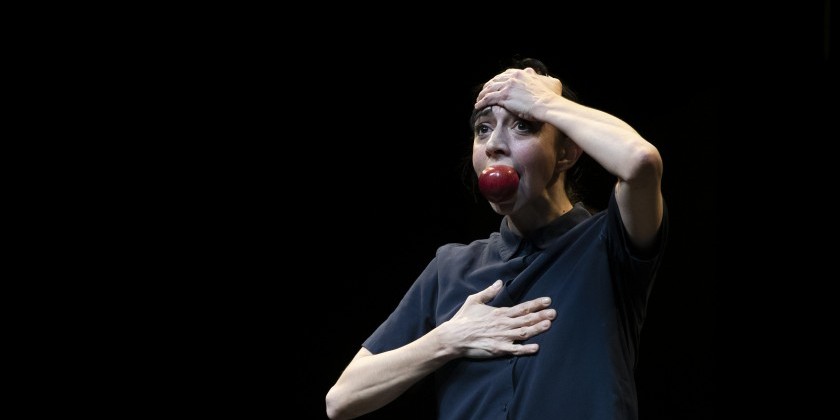Impressions of "Siete Mares" Presented by Oyu Oro Afro Cuban Experimental Dance Ensemble

Aaron Davis Hall
Saturday-Sunday, December 17-18, 2016
In the Yoruba tradition, Yemayá is the great mother Goddess of all things. She is fierce and strong-willed, yet maternal and nurturing. As the ruler of the seas, she is considered to be the most powerful Orisha in the Yoruba pantheon.
Siete Mares, presented by Oyu Oro Afro Cuban Experimental Dance Ensemble, dives into Orisha mythology through drama and dance. Accompanied by a large cast and guests from Santiago, Cuba, this work is the third of the Patakin series directed, choreographed, and written by Danys “La Mora” Perez. The Patakin series shares the oral tradition of Cuba through the rhythm of the drums. This practice is derived from the Yoruba culture of West African and includes song and movement.

Siete Mares celebrates mythology and identity with a series of dance tableaus. The drummers and singers sit or stand upon a platform upstage while Afro Cuban percussionist and scholar Roman Diaz shares a folklore poem in Yoruba about the oceans and bodies of water on Earth. A quick pop of the drums coaxes Afro-Cuban movement and song into the space. Two men and two women peel away from the sides of a totem. They circle it while reaching and grabbing air in every direction. Their screams and guttural ha’s pierce through the melodic calls of the tenor vocalist. Next, a group of men holding long staffs outline the perimeter of the space. The flow of people entering and exiting stays constant as the men are followed by a group of elder women and candleholders.
Large projections of nature on the wall behind the musicians situate us beyond the confines of the theater. We can imagine the earth beneath our feet, the wind against our skin, and the heat from the sun.

Women wear traditional Afro-Cuban attire with embroidered trim, exaggerated sleeves, ruffled skirts, and strategically interlaced headwraps. Their costumes radiate with vibrant shades of silver, red, turquoise, blue, and white. Quick low turns create cascading waves of fabric that spiral into disappearing contrails. The female performers float across the stage as if walking on water. In contrast, the male dancers shuffle with short quick steps in white linen shirts and slacks. Others devour empty space with large strides in billowy pants or cobalt blue skirts that skim the ground.
With the exception of seven solos, each section includes twelve or more dancers moving in unison, which magnifies the power of strength in numbers. Their movement evokes task-based activities from chopping high grass and plowing the field, to sweeping the ground and presenting an offering to the Goddess. Shoulders accent with quick short pulses. Torsos undulate from the top of the head to the base of the spine. Facial expressions reflect pride, joy, and confidence.

During a climactic moment, Yemayá’s ten-foot likeness glides onto stage. She floats above a full skirt that bubbles and balloons until it births seven versions of herself. She remains perched upon this dress altar to welcome her offspring. Each Yemayá representation offers a signature solo. The turquoise Yemayá smashes plates. A blue Yemayá twirls and slashes the air with a large machete.
It is hard to witness Siete Mares without swaying to the rhythm and longing to be invited into the celebration. Their dance and storytelling enlarges the human connection to Yemayá essence.
Movement is the form, voice the fiber, and drums the glue that shapes satisfying moments of visceral transcendence. This spectacle vibrates you to your core.














